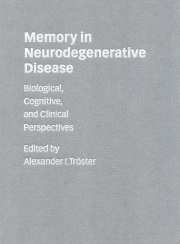Book contents
- Frontmatter
- Contents
- List of contributors
- Preface
- PART I Biological perspectives
- PART II Cognitive perspectives
- 8 The role of executive deficits in memory disorders in neurodegenerative disease
- 9 Prospective memory in aging and neurodegenerative disease
- 10 Remote memory in neurodegenerative disease
- 11 Semantic memory in neurodegenerative disease
- 12 Nondeclarative memory in neurodegenerative disease
- 13 Memory in neurodegenerative disease: what has been learned about the organization of memory?
- PART III Clinical perspectives
- Index
10 - Remote memory in neurodegenerative disease
from PART II - Cognitive perspectives
Published online by Cambridge University Press: 23 November 2009
- Frontmatter
- Contents
- List of contributors
- Preface
- PART I Biological perspectives
- PART II Cognitive perspectives
- 8 The role of executive deficits in memory disorders in neurodegenerative disease
- 9 Prospective memory in aging and neurodegenerative disease
- 10 Remote memory in neurodegenerative disease
- 11 Semantic memory in neurodegenerative disease
- 12 Nondeclarative memory in neurodegenerative disease
- 13 Memory in neurodegenerative disease: what has been learned about the organization of memory?
- PART III Clinical perspectives
- Index
Summary
INTRODUCTION
Memory is the cognitive domain most vulnerable to brain injury. Accordingly, the research literature on memory impairment in brain damage is vast, but most of it concerns deficits that occur after the time of brain injury (or the presumed onset of degenerative disease), that is, anterograde amnesia. Much less is known about the ability of patients to recollect information acquired prior to the onset of disease, yet the practical consequences of marked impairments in remote memory (i.e. retrograde amnesia) are likely to be more serious for an elderly person with dementia than are equally severe anterograde memory deficits. Specifically, a patient's complete failure to remember any of the items on a grocery list does not meaningfully increase the caregiver's burden, because the patient would not be expected to do the shopping anyway. By contrast, if the dementia patient repeatedly wanders away from home and cannot remember how to return (a failure of remote visuospatial memory), the burden on the caregiver is great and institutionalization of the patient is a likely consequence.
One reason why the study of remote memory has languished is because of theoretical and methodological problems. This chapter reviews the applicability of the theoretical distinction between episodic and semantic memory to remote memory and then the methods used to study remote memory. After highlighting limitations of these methods, the chapter summarizes the findings of studies of remote memory in normal aging, amnesia and neurodegenerative diseases.
- Type
- Chapter
- Information
- Memory in Neurodegenerative DiseaseBiological, Cognitive, and Clinical Perspectives, pp. 184 - 196Publisher: Cambridge University PressPrint publication year: 1998



